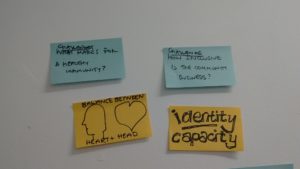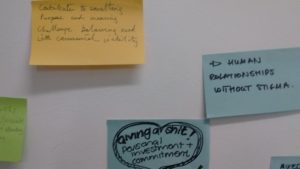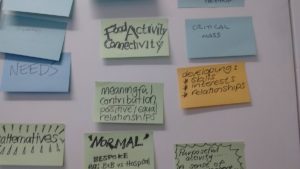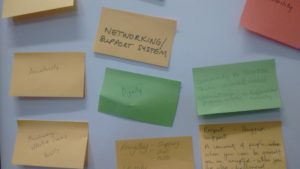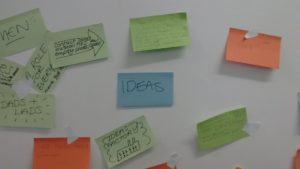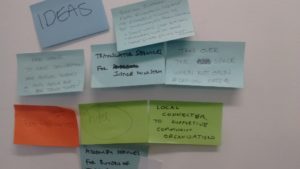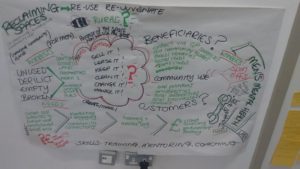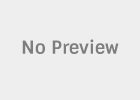Live blogging by David Floyd, Social Spider CIC
10. 11: Event kicking off with info on fire alarms, toilets and lunch arrangements.
10.14: Mark Brown giving a brief introduction to the day – talking about Social Spider CIC’s experience running the national mental health magazine, One in Four, launched based on his own experience of mental health difficulty.
10.17: Now going round the room talking about our ideas for mental health and community business:
Empowering recovery and sustainability; Resilience; I’m here because I can’t do it on my own; Inclusive rather than segregated spaces; Community support to help other members of the community; Doing things differently; Outputs for an impact bond; Interested and excited by iconoclasm; Intrigued by idea of community business angle to clubhouse movement; Taking ‘mental’ bit out of mental health; Interested in making peer-led group therapy accessible; Comfortable spaces; New to the area but interested based on family experience – glad that we’re talking about mental health; Complexities of selling artwork for mental health projects; Interested in how business mobilises the community; Community business challenging low expectations; Running a sustainable business – managing conflict between making money and our mission; How do we make this work and make a difference?; Excited about bursting out of the mental health service bubble and exploring new ideas; Excited about community integration; Making these types of businesses more sustainable; Showing how this is really community led and inclusive; How community business can respond to different needs; Passionate about community activity in general; Interested in role of new technology; Like to make charity more sustainability.
10.27: Now Mark Brown (MB)explaining the hack concept and the plan to develop practical ideas over the course of the day that can be taken on and developed.
The first part of the day will be series of exercises to explore mental health and community business – by lunch time we’ll have a series of prototype ideas that can be worked on during the second half of the day.
10.30: Power to Change chief executive, Vidhya Alakeson(VA), talking about her experience of 10 years working on mental health and personalisation policy: “we’ve sweated blood and tears but I’m not sure that too much has changed in the mental health system”
Now giving a general intro to Power to Change – supporting communities to take control and meet local needs.
Community businesses:
- have a trading model – essentially to long-term viability, key distinction from traditional charities
- locally rooted organisations, led by the community – organisations that really belong to a place
- business benefits the wider community – not just focused on a particular group within the community
Now talking about example of Homebaked community bakery in Liverpool – providing employment, helping to regenerate their local area.
Mental health:
Having worked on personalisation, aim was to enable people to have a meaningful life. Real opportunities for community business as a better form of recovery support – it’s community rooted and inclusive. Social enterprise model often seems segregated:
“The thing that really appeals to me about community business is that it’s for everybody”
We do lots of paperwork but it’s not primarily paperwork that keeps people save – it’s human relationships.
Two community businesses focusing on mental health: Windmill City Farm in Bristol – supports people with mental health needs to volunteer on the farm alongside other community members. Run job training programmes working with Richmond Fellowship.
Spacious Place – a call centre in Burnley supporting people with a range of needs to work in the call centre, and providing space for the wider community.
Challenges:
- Community business is not well known
- Community business is not connected to the mental health system – means freedom but also lack of money
- Limited evidence base around community centred approaches – services that are actually community run as opposed to conventional professional-run services based in the community
- Need to make sure we’re not just thinking about the easier end of the mental health spectrum – how do we make this genuinely inclusive.
10.43: Now Catherine Wilks from Designs in Mind talking about their experience of running an arts mental health social enterprise. They receive a mixture of funding from their local Clinical Commissioning Group, commissions and retail sales.
Last year they launched a new brand called Jolt, which involves Design in Mind creating designs which are manufactured elsewhere. Aim is to challenge low expectations.
Key challenges:
- Running a business and meeting the needs of members.
- Words get in our way: community, charity, business, voluntary – constantly playing a game
- Go from commercial calls to going back into the studio where someone’s in crisis.
- Fine line we walk constantly about how much challenge is good – we’re member led but sometimes members not well enough
- Big discussions about deadlines – have the group say ‘we don’t want any deadlines’ others find them helpful
- We support members by developing skills but then they move on – that’s not good for the business model and make it hard to develop strategy
- Members really want to be employed – we’re working on it
- Integrating into the community is a real challenge because people don’t understand what happens in this safe space
10.50: Now MB giving an ‘apocalyptic vision’ of the situation in UK mental health. General lack of support – particularly for people with severe and enduring mental health difficulties. End of central government support for local authorities leading to reductions in services. Changes to the benefits systems have also created challenges for many people with mental health difficulties.Charitable funding for mental health hasn’t increased. In this apocalyptic situation it’s important to find a new way through. We can’t be sure that the organisations that are there now will be there in 20 years’ time.
We’re looking at three main ways community business might do mental health:
- directly solving a problem – service delivery model
- working with existing state providers – replacing or augmenting existing services
- business changing the way they work to better support people with mental health difficulties
There are some experiences of mental health difficulties that are both difficult to live through but also to design things around.
11.00: Now MB explaining participants are ‘tools in this process’ – everyone has knowledge and experience to bring together. Working in tables, participants are going to spend 15-20 minutes talking to each other on Q: “Why might community business be good for mental health and why might it face challenges?”
11.22: Participants now posting up their post-its of ‘challenges and opportunities’ for mental health and community business. Pictures to follow.
11.25: MB now summarising post-its:
Challenges include: What makes a healthy community?; How inclusive is a community business?; Identity over-capacity; Financial sustainability; Balancing sustainability and support needs
MB notes – there’s some things we want to do that are awesome but are not profit generating
Accessibility; Probability of sustainability; Assumptions; “Diagnosis is irrelevant”; Partnerships across sectors; Peer-to-peer support is critical; Volunteers or employees?
MB note – assuming people who are *disadvantaged* will be over-the-moon to volunteer and not get paid
MB note – discomfort about marrying a hard business sense and what people want and need – it’s difficult but fortunately we’re here until 5pm
Opportunities (include):
Lots about value; Trainees from mental health world getting opportunity to work within community businesses; People living with mental health difficulties want to work; Freedom from diagnosis; Being known understood and seen; Flexible, responsive and compassion
MB note: idea of eeking out a space that’s not state provision
Note from participant: should success of these ideas be measured in terms of ‘mental wealth’ rather than profitability?
Training; Work is medicine – MB ‘that’s is an assumption’; Destigmatizing; Breaking out of medical model; Tailoring
11.35: Now 20 minutes for groups to think about what particular areas of mental health need community business could act upon. Post-its at the ready once more.
11.58: Emerging post-its and discussions on mental health needs (include): Support network; Getting out of social bubble; Deconstructing psychiatric diagnoses and language; Safety; Communication; Growth; Knowledge; Talk and unload; Safe space; Identity and affirmation; Empathy not sympathy; Peer support and relationships; I have my needs and my strengths and they are special…
Here’s some of the needs post-its:
VA notes: many of the needs mentioned are generic human needs. Everybody has needs at different levels and in different needs
MB notes: some people may have different needs in order to actualise those needs.
MB notes: this is great in terms of overall target – interesting to talk about the two specific things that will collide in terms of what we’re doing today:
(i) a sustainable business models
(ii) specific things that people might need in order to meet those needs
Participant note: finding a balance between need and want
MB note: in UK and most countries with mental health systems, they are mostly mental illness systems
Here’s some more of the needs post-its:
12.05 Short Break
12.30 – I do some standing-at-the-front-and-talking on three possible types of initiatives we’re looking to generate ideas for:
Community business approaches to mental health services – for example, taking on public contract to deliver peer support
Mental health focused businesses – for example, Designs in Minds which produce art and design products working with people with mental health difficulties
Initiatives to make community businesses more mental health friendly – such as, an initiative by a community pub to set up a regular peer meet-up – in this case, there is a need to consider how the initiative will fit within the existing business’s business model
12.33: Next phase, ideas blitz: ideas for particular services – ‘a service that does this for this person’; ‘a company that will do/sell this’
Here’s some of the ideas that are emerging:
And here are some more:
Lunch break – idea development – participants decide which ideas they want to take forward.
13.53: I’ve been doing some standing-at-the-front-and-talking about business models.
Now participants who want to lead a group are outlining their ideas:
(i) Ideas Factory – space for people to create ideas; projects to support men
(ii) Food & Mood shop – looking at the link between what we eat and how we feel
(iii) Creative Agency – where role of person with lived experience of mental health difficulty would help inform the design
(iv) Bevy (pub) – building on current model of bussing in older people for weekly meal – replicate a version of this model for mental health
(v) Hotels – operating as safe spaces/alternative to in patient care
(vi) Cafe and Therapy Centre – focus on getting people to talk
(vii) art drop in sessions – working with local businesses
(viii) Grassroots community network of coaches and mentors – skills that you can teach each other
(iv) Peer support for people with lived experience
14.12: In a victory for collaborative working, our nine ideas have merged into five groups.
14.32: Check-in 1 – Groups update on how their ideas are developing, what they’re discussing, what they’ve changed so far.
Group 1:
Idea: set-up shop focused on Mood & Food
- Locally sourced fruit and veg improves your mood
- Employs people with mental health problems
- Sources veg from community farms.
Trying to clarify the idea and looking at different models.
Considering how to make it sustainable and accessible.
Group 2:
Idea: B&B / hotel
Getting less vague
Really good B&B that everyone wants to come to.
Has community space open during the day
Some beds commissioned by the CCG – focused around people with mental distress.
Other beds for homeless people – funded by other public agencies.
MB raises question about legal ramifications around crisis support.
Group say – need to check the process, couldn’t be commissioned as acute crisis beds
Group 3:
Idea: coaching
Initial discussions and exploration of Clubhouse model.
Democratisation of coaching
Group 4:
Idea: pub support
Debate about how we get different groups into pub – supporting footfall to support core business
Is it a free venue for community activity? How do you ensure it’s inclusive?
Group 5:
Idea: reclaiming spaces / ideas factory
Finding unused venues and spaces – using for community activity
Link with mentoring and coaching group
MB notes the example of Self Help Housing website.
Here’s how Group 5 ideas is developing:
15.10: Check-in Two
Group 5:
Idea: reclaiming spaces / ideas factory
Going well but getting bigger and bigger – so now trying to hone things down
Haven’t yet identified a specific community
Group 4:
Idea: pub support
Aim to broaden The Bevy’s offer so group access it for free
Discussing how to incentivize that
Bring community champions together as a peer group
Looking at Mind in Brighton – list of specific groups to reach out to
Also CCG etc. looking at ways of cutting costs to public sector
MB: what are the additional costs on top of the costs of running the pub?
Group’s response: Seed funding for initial outreach
Group 2:
Idea: B&B / hotel
We’d start with a fantastic B&B – then add the beds bit on top of that.
Would employ people with mental health difficulties and ex-homeless people
Inclusive community space would be there from the start
Acute beds eliminate is really hard – so would be a longer term aspiration once the community focused B&B is up and running
MB: raises example of Quaker study centre who may have had similar experiences
VA: raises example of the Bevy’s community share – which in itself had the effect of bringing the community together – funding and community development together
Group 1:
Idea: set-up shop focused on Mood & Food
Idea developed further – including ideas for voucher schemes.
Balancing needs/demands of different customers.
Next question – how we get things off the ground – get funding
Group 3:
Idea: coaching
Talked more about what the model would be.
Considering building on AA model – mission to democratize coaching.
Freemium model with ‘chapters’ offering peer-to-peer support.
Membership model where people would get actual coaching training.
15.49: Checkin 3
Group 5:
Thoughts about working with univerisities
Specifics about employing people with mhd to do renovation – repurposing
Group 4:
Getting something we’re getting quite excited about – Bevy Ridge model, recreating the Beveridge model
Community space with inclusivity. Something cool going on
Group 3:
Absolutely buzzing – using canvas as a guide
Honed value proposition
Talked a lot more about structure – borrowing from 12 steps
Completely free but with training elements.
Eco-system of support for anyone who wants to be involved in coaching and mentoring.
Group 2:
People sat at the table couldn’t necessarily do this.
Need to be embedded in a specific place.
Where might we find a place to do that – eg. Hull, city of culture.
Group 1:
Next steps:
Potential Partners – Mind in Ealing; Ealing Council; West London Mental Health Trust;
Testing the idea with customers.
Funding needed to test it.
15.54: MB – we’re into the final furlong, now we need to hammer the ideas down into a page worth of presentation including ideas about funding needing ask. 25 mins to do it.
16.21: Final Presentations:
Group 4: The BevyRidge model.
A footfall-based business that has community spaces.
What’s on offer: If you’re a group that wants to run something re: mental health in the community, we’re offering a free space, facilities, food & drink at a low or neutral cost – good use of down time. Advertising through connections and networks. Transport (Bevy has a bus). Induction programme. Support to self-sustain. Identifying people who have potential to run groups.
What you have to do for that offer: you have to muck and run the event. You have to contribute to the whole – for example via volunteering. The activity has to be open to everyone. Small financial contribution. Buy in to shared values.
As people get more involved they will meet other groups.
Business model is getting 20 groups to use it so you build a critical mass.
What we need: Seed money – could be repayable grant. Assets may need development.
Keen to work on this to create a business model that could be applied in other places.
MB: how much money would you need to get this going?
Group response: exactly the amount you could get from Awards for All.
Q from participant? – How does this support people with MHD?
Group response: Yes. Elements would tackle stigma.
Group 3: Democratize Coaching
Beneficiaries – support structure and eco-system.
Lots of ways you get involved – coaching circle, mentoring, peer-to-peer based very safe spaces, basics of non-judgemental support structures.
Train as a mentor or a coach. Skills development and CPD credits. Anyone can enter at any stage.
Corporates (and other established entities) – professional partnerships and staff skills development.
Capital – lean, round of crowd-funding, people who want to be involved cashflow their support (purchasing workshops in advance)
Business support network for trained coaches – with annual membership
Mental health context – inclusive environment for people in recovery. Community outreach to people with mental health difficulties. Outreach to GPs surgeries with possible grant funding.
Organisation that is primarily about supporting each other as humans. Target groups that need support but not making a sell to identity.
Local groups called Chapters – set of resources provided, part of a wider community. Local chapters mainly issue neutral but their could also be ‘vertical chapters’ focused on particular issues.
MB question: what would you do if you didn’t secure grants? Have to have a critical mass before you can show the effects. What do you need to get started?
Group response: don’t need any money to run them.
MB question: question of trust – why would people engage with this and believe in it?
Group response: chapters would need someone who is trained and has suitability to do that? Making coaching and mentoring accessible.
Revenue: membership; events; training; corporate partnerships.
Question from me: What is the problem you’re solving?
Group response: Coaches need to local group to associate with. Professional network. Many coaches working on their own. Opportunity for coaches to give back to people with mental health difficulties.
Group 5: Men Reclaiming (head) Spaces for Men
Informed by a discussion around high rates of suicide amongst men.
Repair; Refreshing; Making use of derelict spaces; Just got bigger and bigger
What’s new is around relationships we might bring in to the ideas.
Challenge of focusing on the question we’re trying to answer.
Space where men could come and talk about taboo topics – while doing something natural to them.
Unused buildings in the community. Learn new skills: carpentry.
Elevator pitch: Learn, build, talk and then repeat.
Save space for men with mental health challenges – could be commissioned by public sector.
MB question: observation is having quite landed at what you’re selling and to whom
Group response: one of the ideas was co-creating the idea with a university or other local agency. We want this to be something sustainable via working with others.
Participant point: local authorities have an asset disposal strategy – and need to demonstrate social value, so potential take asset of their hands.
Participant point: potential to create a range of businesses – furniture making, handymen business etc.
Group Two: B&B
Looking to address stigma.
Preventing admission.
Developing community run upmarket B&B – open throughout the day, a non-alcoholic version of the Bevy but with rooms
Room set aside funding by the CCG as a crisis bed.
Coming to somewhere that you already knew.
High quality venture to appeal to people on a commercial basis as a nice place to go.
Best Value often translate to budget – aim here is to make the space upmarket but appeal to everyone.
Cafe run by people with mental illness.
Place important – none of us lived a place where we thought this would work.
New destination places. Next City of Culture is Paisley.
Challenging stigma by challenging idea that something with mental health association is low quality.
Group 1: Food & Mood
Context is participant’s work with MindFood in Ealing. This project is potential extension.
Lack of opportunities for people with mental health difficulties in Ealing who are out of work and want to work.
Also looking for sustainable ways of funding MindFood’s work.
Multi-purpose hub.
Training opportunities.
Sells food that’s evidence based to improve your mood.
Mainly appealing to a more affluent market.
Superfood juice bar.
Locally sourced conscious food.
Funding: cost £100k to set up
Income streams: produce sales; associates; CCG and local authority trainee opportunities; community membership scheme
Participant point: connect with Bright Light in Ealing
MB question: if your £100k was a loan, how long would it take to pay back? What level of profit is present in the model?
Group response: A lot of that will come back to contracts with CCG. Looking at model 1/3 / 1/3 / 1/3 – produce sales/CCG/use of space.
17.10: Round-up – including me giving a brief overview of the support we’ll be offering to take ideas forward – and the support potentially available via the Bright Ideas Fund.
